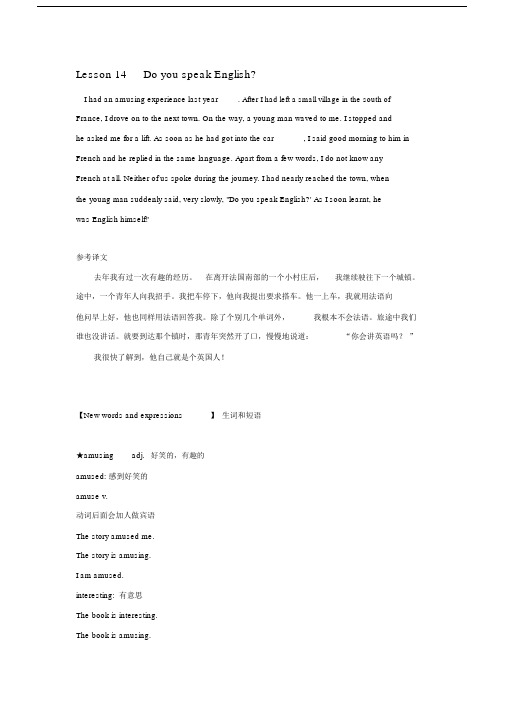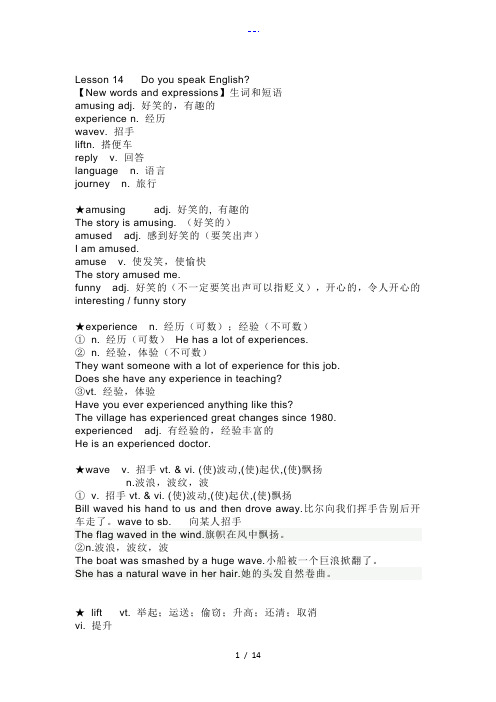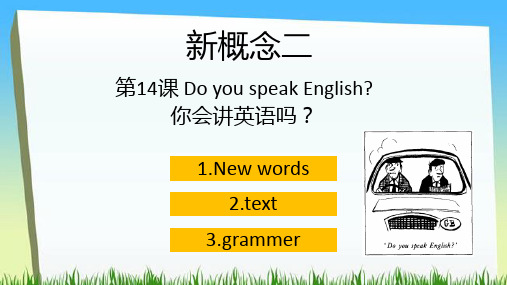新概念第二册第14课课文讲解
- 格式:doc
- 大小:33.00 KB
- 文档页数:8

Lesson 14 Do you speak English?I had an amusing experience last year. After I had left a small village in the south of France, I drove on to the next town. On the way, a young man waved to me. I stopped andhe asked me for a lift. As soon as he had got into the car, I said good morning to him in French and he replied in the same language. Apart from a few words, I do not know anyFrench at all. Neither of us spoke during the journey. I had nearly reached the town, whenthe young man suddenly said, very slowly, "Do you speak English?' As I soon learnt, hewas English himself!'参考译文去年我有过一次有趣的经历。
在离开法国南部的一个小村庄后,我继续驶往下一个城镇。
途中,一个青年人向我招手。
我把车停下,他向我提出要求搭车。
他一上车,我就用法语向他问早上好,他也同样用法语回答我。
除了个别几个单词外,我根本不会法语。
旅途中我们谁也没讲话。
就要到达那个镇时,那青年突然开了口,慢慢地说道:“你会讲英语吗?”我很快了解到,他自己就是个英国人!【New words and expressions】生词和短语★amusing adj.好笑的,有趣的amused: 感到好笑的amuse v.动词后面会加人做宾语The story amused me.The story is amusing.I am amused.interesting: 有意思The book is interesting.The book is amusing.funny: 好笑的,可以指,开心的,令人开心的interesting/funny story★experience n.、体:不可数名、感受:可数名He has a lot of experience. He has a lot of experiences.Experience is the best teacher .是最好的老。

Lesson 14 Do you speak English?【New words and expressions】生词和短语amusing adj. 好笑的,有趣的experience n. 经历wavev. 招手liftn. 搭便车reply v. 回答language n. 语言journey n. 旅行★amusing adj. 好笑的, 有趣的The story is amusing. (好笑的)amused adj. 感到好笑的(要笑出声)I am amused.amuse v. 使发笑,使愉快The story amused me.funny adj. 好笑的(不一定要笑出声可以指贬义),开心的,令人开心的interesting / funny story★experience n. 经历(可数);经验(不可数)①n. 经历(可数)He has a lot of experiences.②n. 经验,体验(不可数)They want someone with a lot of experience for this job.Does she have any experience in teaching?③vt. 经验,体验Have you ever experienced anything like this?The village has experienced great changes since 1980.experienced adj. 有经验的,经验丰富的He is an experienced doctor.★wave v. 招手vt. & vi. (使)波动,(使)起伏,(使)飘扬n.波浪,波纹,波①v. 招手vt. & vi. (使)波动,(使)起伏,(使)飘扬Bill waved his hand to us and then drove away.比尔向我们挥手告别后开车走了。

逐句精讲新概念英语第二册第十四课你会讲英语吗?逐句精讲新概念英语第二册:第十四课你会讲英语吗?Lesson 14 Do you speak English?课文内容:I had an amusing experience last year. After I had left a small village in the south of France, I drove on to the next town. On the way, a young man waved to me. I stopped and he asked me for a lift.As soon as he had got into the car, I said good morning to him in French and he replied in the same language. Apart from a few words, I do not know any French at all. Neither of us spoke during the journey.I had nearly reached the town, when the young man suddenly said, very slowly, ‘Do you speak English?' As I soon learnt, he was English himself.本文语法:过去完成时语法归纳:过去完成时的形式:had +过去分词表示过去某个时间以前已经完成的动作或存在的状态。
一般总结为:过去的过去发生到过去结束。
经常与过去时间状语连用。
By the end of last month I had worked in New Oriental School for six years.到上个月底我已经在新东方学校工作六年了。





裕兴新概念英语第二册复习笔记第十四课课文讲解I had an amusing experience last year. After I had left a small village in the south of France, I drove on to the next town. On the way, a young man waved to me. I stopped and he asked me for a lift. As soon as he had got into the car, I said good morning to him in French and he replied in the same language. Apart from a few words, I do not know any French at all. Neither of us spoke during the journey. I had nearly reached the town, when the young man suddenly said, very slowly, "Do you speak English?' As I soon learnt, he was English himself!'去年我有过一次有趣的经历。
在离开法国南部的一个小村庄后,我继续驶往下一个城镇。
途中,一个青年人向我招手。
我把车停下,他向我提出要求搭车。
他一上车,我就用法语向他问早上好,他也同样用法语回答我。
除了个别几个单词外,我根本不会法语。
旅途中我们谁也没讲话。
就要到达那个镇时,那青年突然开了口,慢慢地说道:“你会讲英语吗?”我很快了解到,他自己就是个英国人!1. I had an amusing experience last year.leave1) v. 离开leave England for a tour of the world 离开英国去做一次环球旅行leave for England 离开去英国leave Shanghai 离开上海leave for Shanghai 离开去上海2) 辞去,退学eg. He left his job for a better one. 他辞去工作目的是为了找个更好的。

新概念英语第二册:第14课课文详解及语法解析课文详注 Further notes on the text1.After I had left a small village in the south of France, I drove on to the next town.在离开法国南部的一个小村庄后,我继续驶往下一个城镇。
(1)表示一个大范围中的某一个地方时要用介词in:Beijing is in the north of China.北京位于中国的北部。
(2)副词on紧跟在动词后面时能够表示“向前”、“继续下去”等意义:He talked on until everybody had gone.他滔滔不绝地讲到大家都走了。
I was reading when my friend called. After he had gone,I went on to read.我朋友来看我时我正在看书。
他走了以后我便继续看书。
2.I stopped and he asked me for a lift.我把车停下,他向我提出要求搭车。
名词lift的含义之一是“(给步行者)搭便车”、“免费搭车”:Last night, I had to walk home. No one would give me a lift.昨晚我不得不走回家。
谁也不愿意让我搭车。
I was lucky today. I got a lift soon after I had leftthe village.我今天运气好,离开村子不久就搭上了便车。
3.As soon as he had got into the car, I said goodmorning to him in French and he replied in the same language.他一上车,我就用法语向他问早上好,他也同样用法语回答我。
(1)表示时间的固定短语as soon as通常表示“一……就……”,即两个动词之间相隔时间非常短:Tell him the news as soon as you meet him.你一遇见他就把这消息告诉他。


Lesson 14 Do you speak English?I had an amusing experience last year. After I had left a small village in the south of France, I drove on to the next town. On the way, a young man waved to me. I stopped and he asked me for a lift. As soon as he had got into the car, I said good morning to him in French and he replied in the same language. Apart from a few words, I do not know any French at all. Neither of us spoke during the journey. I had nearly reached the town, when the young man suddenly said, very slowly, "Do you speak English?' As I soon learnt, he was English himself!'参考译文去年我有过一次有趣的经历。
在离开法国南部的一个小村庄后,我继续驶往下一个城镇。
途中,一个青年人向我招手。
我把车停下,他向我提出要求搭车。
他一上车,我就用法语向他问早上好,他也同样用法语回答我。
除了个别几个单词外,我根本不会法语。
旅途中我们谁也没讲话。
就要到达那个镇时,那青年突然开了口,慢慢地说道:“你会讲英语吗?”我很快了解到,他自己就是个英国人!【New words and expressions】生词和短语★amusing adj. 好笑的,有趣的amused:感到好笑的amuse v.动词后面会加人做宾语The story amused me.The story is amusing.I am amused.interesting:有意思The book is interesting.The book is amusing.funny:好笑的,可以指贬义,开心的,令人开心的interesting/funny story★experience n. 经历经验、体验:不可数名词经历、感受:可数名词He has a lot of experience. He has a lot of experiences.Experience is the best teacher. 经验是最好的老师。

【New words and expressions】amusing [?‘mju:zi?]adj. 好笑的,有趣的experience [iks’pi?ri?ns] n. 经历wave [weiv] v. 招手lift [lift] n. 搭便车reply [ri'plai] v. 回答language ['l??ɡwid?] n. 语言journey ['d??:ni] n. 旅行1. amusing adj. 令人发笑的The story is amusing. (好笑的)amused adj. 感到好笑的I am amused.amuse v. 使发笑,使愉快The story amuses me.funny adj. 好笑的(不一定要笑出声可以指贬义),开心的,令人开心的interesting / funny story类似词语:excite 令人兴奋exciting excitedinterest 令人感兴趣interesting interestedThe exciting news made us excited.The book is interesting and we are interested in it.2. experience①n. 经历(可数)an unusual experienceHe has a lot of experiences.②n. 经验,体验(不可数)She has a lot of teaching experience.③vt. 经验,体验Ganzhou has experienced great changes.experienced adj. 有经验的,经验丰富的He is an experienced doctor.inexperienced 无经验的,不熟练的eg. He is inexperienced in looking after children 3.wave v. 招手wave to sb. 向某人招手4. lift1) Vt.举起,抬起eg. The box is too heavy ;I can’t lift it.2)vi. (雾、云)消散,(雨、雪)停止Eg. The fog has lifted.3) n. 电梯elevator (Am)4) n. 搭便车give sb a lift 让某人搭便车5. reply v. 答复;回答reply to = answer 回应;回答answer my questionreply to my question我会给你回信的。



Lesson 14 Do youspeakEnglish?I hadan amusing experience last year. After I hadleftasmall village in the south ofFrance, I droveon tothenexttown.On the way, a youngman waved to me.I stopped and he asked me for alif t.Assoon as he had got intothecar,Isaidgoodmorningto himin French and he repliedin the same language.Apart from a few words, Idonot know anyFrench at all. Neither ofus spoke during the journey. I hadnearly reached the town, when the youngman suddenly said,very slowly, "Do you speak English?'As Isoon learnt, he was Engl ish himself!'参考译文去年我有过一次有趣的经历。
在离开法国南部的一个小村庄后,我继续驶往下一个城镇。
途中,一个青年人向我招手。
我把车停下,他向我提出要求搭车。
他一上车,我就用法语向他问早上好,他也同样用法语回答我。
除了个别几个单词外,我根本不会法语。
旅途中我们谁也没讲话。
就要到达那个镇时,那青年突然开了口,慢慢地说道:“你会讲英语吗?”我很快了解到,他自己就是个英国人!【Newwords and expressions】生词和短语★amusing adj.好笑的,有趣的amused:感到好笑的amuse v.动词后面会加人做宾语The story amused me.Thestoryisamusing.I am amused.interesting:有意思Thebook isinteresting.Thebook isamusing.funny:好笑的,可以指贬义,开心的,令人开心的interesting/funnystory★experiencen.经历经验、体验:不可数名词经历、感受:可数名词He hasa lot ofexperience.Hehas a lot of experiences.Experience is the bestteacher.经验是最好的老师。
Theystilllackedexperience.他们经验还不足。
Somethingabout your backgroundand experience. 谈谈你的背景情况和经历。
+s(a/an),经历;原形,经验experienced:有经验的He is an experienced doctor.表示做某事的经验,其后通常不接不定式,而接in [of] doing sth。
ﻫHe hashad m uch experiencein[of] thiskind of work. 他有丰富的经验做这项工作。
experiece in[of]teaching=teaching experience(教学经验)experience还可表示“体验”“经历”等,只用作及物动词。
All childrenwillexperiencefun andexcitementin learning and growing up.在学习和成长中的所有儿童都将感受到快乐和兴奋。
The child had never experienced kindness.这孩子从未受过善待。
词语扩展:experienced作形容词,表示有经验的。
例句:He isan experienced teacher.ﻫ他是一位经验丰富的老师。
★wavevt.向…挥手示意;使成波浪形vi.波动;起伏;挥手示意;摇动;呈波形wave to sb;向某人招手Thechildren waved to their teacher. 孩子们向老师招手。
★liftn.搭便车vt. 举起;提升I wasa lift.take a bus/taxi/lifttake a lift:搭便车Itake a list.The student gave me a lift.give sb alift:让某人搭便车Iwillgive you a lift to the airport.我可以顺便送你去机场。
B wants to take a lift.A will giveBa lift.hitchhiker:搭便车的人liftsb. /sth. up 将某人/某物抬起He lifted the box.他举起了箱子。
★reply v. 回答answerHe answered/replied.answer sth/reply to sth.answer the letter:回信Iwillreply to the letter.★languagen. 语言native language:母语mothertongueThenative languageis Chinese.My mothertongue is Chinese.★journeyn. 旅行begin atrip:开始一个旅行begin ajourneytrip,travel,tourtrip:短距离旅行或出差go onbusiness/goon a triptravel:周游(长途)tour,为了玩tourist:游客journey:所有的旅行go on a journey, 3 days'journey2 hours' journeyvoyage:旅行(海上)flight:空中飞行journey:偏重于陆地旅行trip;travel;tour;journey;voyage;flight【noteson thetext】●Idrove ontothe next town. 我继续驶往下一个城镇。
句中的副词on有“继续地”“不停顿的”的意思。
Hecan work on without abreak. 他能不停地工作。
●in the south of表达方位的表达方式一共有3个介词,in,on,to没有相接的,是相离的,to接壤,on在什么里面,in●On the way 在途中,即将发生in the way在路上,在途中挡住去路ina way在某种程度上in this way 这样by the way顺便提一下,另外by way of通过…方法;经由giveway让路,让步;撤退in everyway在各方面,以各种方式inno way决不,一点也不in theway of妨碍;在…方面,关于lead the way引路,带路;示范make way让路;开路;进展make one'sown way成功,发迹make one'sway前进,前往,行进under way在进行中,前进着●assoonas:一...就...户名一定要加一个句子(时间主语从句),后面的先发生As soon as Ihadreceived the letter,Iringed/called him back.只要是状语从句,一旦遇到将来时,变为一般现在时Assoon as you arrive,you must callme.As soon as强调两个动作几乎是连在一起的●Ask for a lift 要求搭车搭便车:take a lift给某人搭便车:give sb alift●Apart from除了.....之外Except They were all there except me. 除了我以外他们都在那里。
except for含有对整体中的某一个方面不满意Except forhis height,he isveryexcellent.The article is very goodexceptfor his handwriting.Besides She has so much else todo besidesdoing her homework.除了做她的作业外她还有许多其他的事情要做。
in addition toHespeaks French inaddition to English.他除了说英语之外,还会说法语。
I invited everyone exceptGeorge. Except for George I invited everyone.Exceptfor/apart fromthis,everythingisin order.●not at all:一点点都不I don't like it.I don't like itat all.●neitherduring the journey:在旅途当中,自始自终neither of sb,eitherof sbeither of sb:什么当中的任何一个neitherofsb:什么当中的任何一个都不either,neither都是指两个当中的任何一个如果不只两个人,就变成none of●AsI soonlearnt,he was English himself! 我很快就知道,他自己就是一个英国人。
As+主语+动词+逗号+句子,As:正如AsI think,itis thecoldest day in the year.As mymothersaid/AsI heardAs he said,English is easy tolearn.●himself,反身代词单独放在句尾,起强调作用I read English myself.I stopped=I stopped thecar.ask sb for sth:请求某人要求得到什么东西saygoodbye,say sorry,say hello,saygood morning tohim用某种语言:in+某种语言IspeakEnglish.I say a word in Chinese.reply要想加宾语要加toin the smaelanguageassoon as:一...就...Assoon as I had enteredthe room,Itook off my coat at once.【Key structures】过去完成时过去完成时:过去的过去或两个动作都在过去,一个动作在前,一个在后,发生在前的动作为过去完成时过去完成时一定要以一个过去时态在铺垫,这个动作一定要发生在had done之后Afterhe had finished work he wenthome.The childrenran awayafter theyhad broken thewindow.until:直到什么时候为止,直到什么时候才until,在后面一个从句之前发生了主句until,主句和从句两个都用一般过去时对,主句和从句然后一个用过去完成是也对I had not understood the problem untilhe explained it.after后面会加过去完成时,before后面会加一般过去时【Specialdifficulties】a.ask and ask forask sth:问什么什么东西,ask aquestion/asksbask forsth:要求得到,ask for the answerc.whichof,either of,neitherof,both ofeither of:两者当中的任何一个neither of:两者都不which of:那一个,whichofthetwoboth of:两者都Which of thetwodo you like?I want both of them.I want either of them.Iwant neither of them. 【Multiplechoicequestions】6.Ispeak a fewwords of French. I don't know ______French....b...A. Many B. Much C.Plenty ofD. AlittleFrench不可数,不能用manyplenty of:足够多的not much: a littlenot alittle: much7.Neitherof us spoke.We ______ ...c....A. Neither spoke C.Either spoke C.Both didn't speak D. Neitherdidn'tspeakneither不会和not连用either:任何一个both:两个都neitherof,不能说we neither,只能说neitherofus9.Theyoung man waved the writer.He_____him. ....c....A. Saluted B.Greeted C. Signalled to D. noddedsalute:n.致敬,欢迎;敬礼Greetvt. 欢迎,迎接;致敬,致意;映入眼帘Signal vt.用信号通知;标志10.Heasked for a lift.He wasa_______ ..b...A.TrampB.HitchhikerC.PassengerD.Foreignertramp:流浪汉hitch hiker:搭便车的人passenger:乘客,付车钱12.The writer had ______ reached thetown whenthe young man sp oke.A. OftenB. AlmostC.Sometimes D.Just asalmost=nearlyjustas 正当...时候+时间主语ﻫ--。